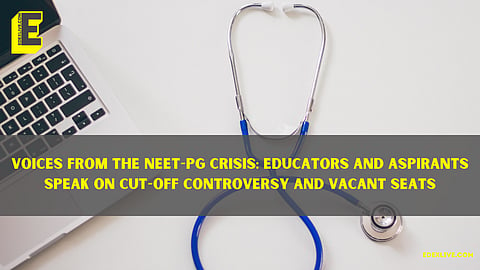

Despite a growing demand for specialised doctors in India, over 15,000 postgraduate medical seats remain vacant after two rounds of the National Eligibility cum Entrance Test - Postgraduate (NEET-PG) 2024 counselling. This startling gap has reignited the debate over whether the National Board of Examinations in Medical Sciences (NBEMS) will reduce the qualifying percentile to address the issue.
Such interventions are not unprecedented. In 2023, NBEMS controversially reduced the qualifying percentile to zero for all categories, sparking outrage and concern over its impact on the quality of postgraduate medical education. Similarly, in 2022, the percentile was reduced by 15 points across categories. While stakeholders acknowledge the need to prevent seat wastage, the issue has once again divided opinions.
Why are PG seats still vacant?
Dr Priyesh Nayak, a NEET-PG educator and third-year orthopaedics resident, attributes the vacancies primarily to non-clinical branches.
“Most vacant seats are in non-clinical disciplines,” he said and adds, “These fields offer limited career opportunities, with most graduates confined to teaching roles in medical colleges. After years of rigorous medical training, candidates want patient interaction and practical practice, which non-clinical branches lack.”
Dr Nayak also noted that reducing the cut-off percentile could benefit those interested in non-clinical fields but cautioned against a blanket reduction.
“There should still be a minimum qualifying percentile — ideally, 30 percentile — to maintain the quality of medical education. Striking a balance between filling seats and ensuring competent professionals is crucial,” he added.
The zero percentile debate: Misinformation and realities
The decision to drop the cut-off to zero percentile in 2023 remains a sore point for many in the medical fraternity. Critics claim it undermined merit, but Dr Arun Kumar, National General Secretary of the United Doctors Front Association (UDFA) countered this narrative.
“Zero percentile doesn’t mean students with zero or negative marks get admissions,” he clarified. “It simply opens counselling to all candidates, but seat allocation is still based on scores and ranks. This ensures that seats don’t remain vacant, which benefits the system as a whole,” he pointed out.
However, students like Pratishta, a NEET-PG 2024 counselling participant, feel the impact of these reductions is far from equitable.
“Private colleges gain the most from these changes because government college seats are usually filled,” she said. “For those of us trying for upgrades, reduced cut-offs don’t guarantee anything — seats remain the same, and government seats rarely open up.”
Systemic flaws in medical education
The recurring issue of vacant seats points to deeper structural flaws in India’s medical education system. The surge in medical colleges over the past decade has significantly increased the number of undergraduate (UG) seats, but the number of postgraduate (PG) seats has not kept pace.
“It takes five to six years for a new medical college to meet the requirements to offer PG courses,” Dr Nayak explained and added, “While UG admissions increase immediately, PG expansions lag. In the coming years, this gap might stabilise, but for now, it’s a major issue.”
Dr Nayak also highlighted the need for reform in how exams and counselling are conducted.
“AIIMS (All India Institute of Medical Sciences) conducts its exams and counselling seamlessly, without delays or controversies,” he said. “The National Board of Examinations should follow their example. This year’s repeated postponements and mismatched schedules have mentally harassed serious aspirants,” he added.
The financial and emotional toll on aspirants
For many students, the challenges extend beyond academic hurdles to financial and emotional strain. Participating in multiple counselling rounds is expensive, as refunds for seat withdrawals often take months.
“Middle-class and financially weaker students can’t afford to switch colleges repeatedly,” Pratishta shared and added, “This uncertainty and chaotic process leave us feeling drained. I’ve lost hope in the system, and I’m not alone in this.”
Mental health concerns among medical aspirants have been exacerbated by the protracted nature of this year’s counselling process. “The delays and lack of clarity have taken a toll on students, especially those from financially unstable backgrounds. Reforms are urgently needed to make the system more predictable and fair,” Dr Nayak observed.
What’s at stake?
The NBEMS now faces a critical decision: Should it lower the NEET-PG 2024 cut-offs to fill vacant seats?
While such a move might address immediate concerns, experts warn against losing sight of long-term goals, such as maintaining the quality of medical education and bridging the gap between UG and PG seats. “Postgraduate specialisation is like marrying a branch of medicine for life,” Dr Nayak said and added, “Aspirants must choose wisely, based on their interests — not simply because a seat is available.”
For students like Pratishta, however, the uncertainty continues. Will NBEMS’ decision bring relief or add to the chaos?
One thing is clear: The need for systemic reform has never been more urgent.
